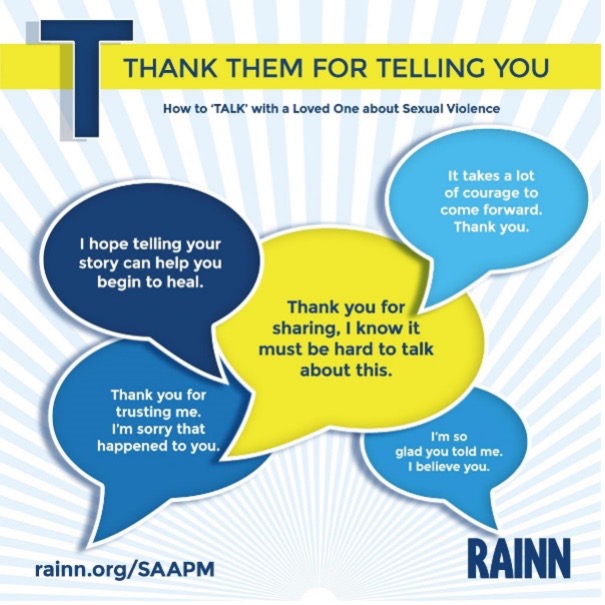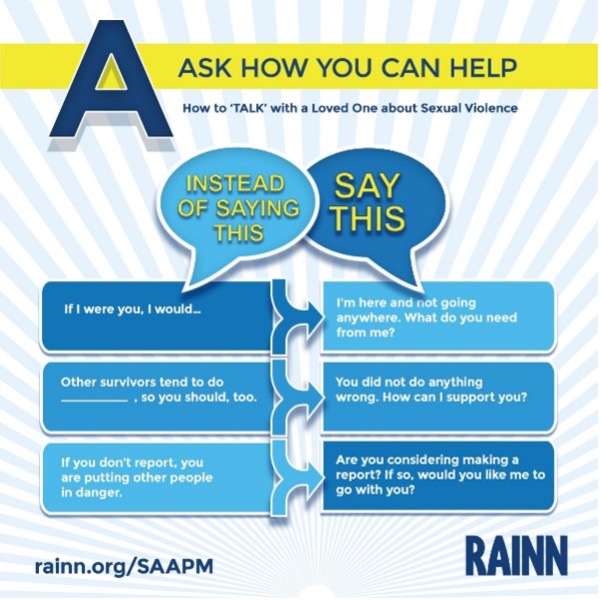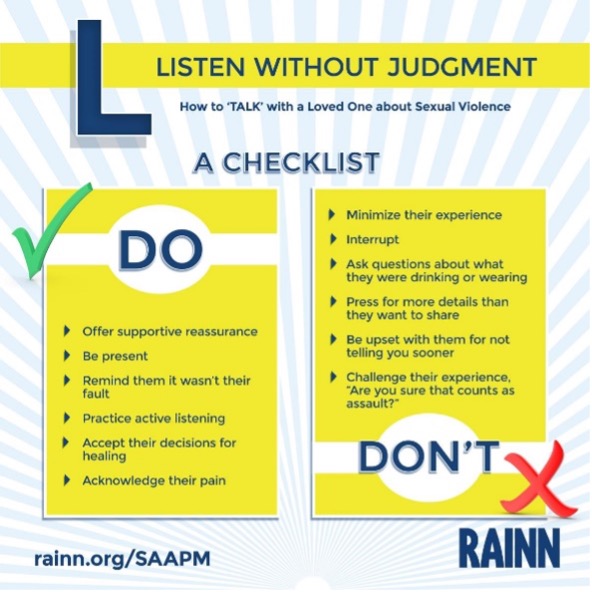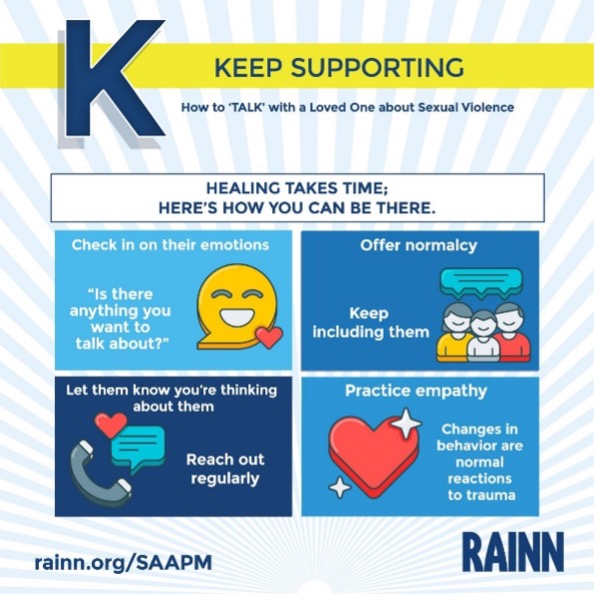Support a Survivor
How to support someone going through domestic/family/intimate-partner violence
- Don’t be afraid to reach out to a friend who you think needs help. Tell them you’re concerned for their safety and want to help. Not sure what to say? Check out this helpful article.
- Be supportive and listen patiently. Acknowledge their feelings and be respectful of their decisions.
- Help your friend recognize that the abuse is not “normal” and is NOT their fault. Everyone deserves a healthy, nonviolent relationship.
- Focus on your friend, not the abusive partner. Abusive relationships are complicated. Your friend may feel bonded or loyal to their partner despite the abuse. For many different reasons, your friend may choose to stay even if they recognize the abuse and want it to stop. Putting down the abuser, focusing blame on them, or telling your friend to “just leave” could all make your friend feel the need to defend their abuser or feel that you are judging them. It’s important for your friend to know that they can still confide in you and count on you, even while having complicated feelings for their abuser.
- Allow your friend to make their own decisions. Remember that the dynamics of abuse are complicated and there may be many elements you do not know about or understand. Trust your friend to know what is safest and best for them in the moment. Also, your friend is currently experiencing having power and control taken away from them by their abuser. Forcefully telling them what they should do mimics the actions of their abuser and may make your friend feel unsafe or further disempowered.
- Connect your friend to resources in their community that can give them information and guidance. Remember, loveisrespect.org, a national resource, can help.
- Help them develop a safety plan if you believe that they are in an abusive relationship.
- Don’t give them an ultimatum. Telling your friend that if they don’t leave their abuser, you can’t be friends anymore may seem like it could motivate your friend to leave. However, people end up staying for many complicated reasons and often go back to abusive relationships many times before leaving for good. Understand that leaving is often a process. When you give a survivor an ultimatum, you may be taking away your support from them at a future point when they are ready to leave for good.
- If they break up with the abusive partner, continue to be supportive after the relationship is over.
- Do not confront their abuser or post negative things about them online. When this happens, the abuser feels a loss of control/power and most often responds by increasing violence and abuse toward their victim.
- Even when you feel like there’s nothing you can do, don’t forget that by being supportive and caring, you’re already doing a lot.
How to support a sexual assault survivor
It’s not always easy to know what to say when someone tells you they’ve been sexually assaulted, especially when that person is a family member, friend, or loved one. The following information is meant to help you support the survivors in your life.
Consider the following ways of showing support
- Listen. Be there. Communicate without judgment.
- If the survivor seeks medical attention or plans to report, offer to be there. Your presence can offer the support they need.
- Encourage the survivor to get support. Share resources like the Survivor Advocacy Center, the National Sexual Assault Hotline and RAINN, but realize that only they can make the decision to get help.
- Be patient. Remember, there is no timetable for recovering from trauma. Avoid putting pressure on them to engage in activities they aren’t ready to do yet.
- Encourage them to practice good self-care during this difficult time.
- If someone you care about is considering suicide, learn the warning signs, and offer help and support. For more information about suicide prevention please visit the National Suicide Prevention Lifeline or call 988 any time, day or night.
Continued Support
There’s no timetable when it comes to recovering from sexual violence. If someone trusted you enough to disclose the event to you, consider the following ways to show your continued support.
- Avoid judgment. It can be difficult to watch a survivor struggle with the effects of sexual assault for an extended period of time. Avoid phrases that suggest they’re taking too long to recover such as, “You’ve been acting like this for a while now,” or “How much longer will you feel this way?”
- Check in periodically. The event may have happened a long time ago, but that doesn’t mean the pain is gone. Check in with the survivor to remind them you still care about their well-being and believe their story.
- Use the SACFL. You’re a strong supporter, but that doesn’t mean you’re equipped to manage someone else’s health. Lean on the Survivor Advocacy Center for support.
It’s important that you take care of yourself, too. You can call the SACFL’s office at (315) 331-1171, the National Sexual Assault Hotline at 988 or visit online.rainn.org and receive confidential support.
Not sure what to say to a survivor of sexual assault? Check out this guide from RAINN.org.
Graphic with credit to RAINN:




